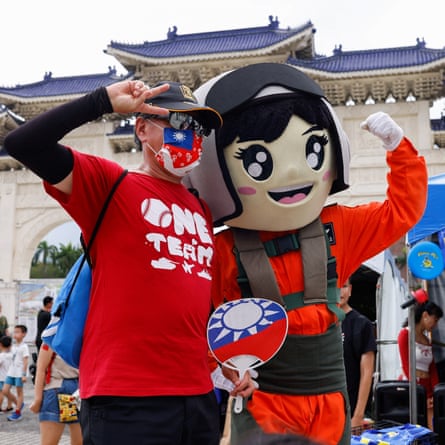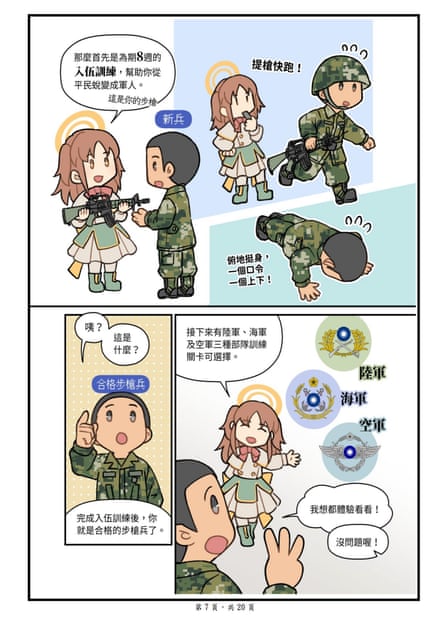Amy Hawkins

For many people in Taiwan, the threat of conflict with China is a distant prospect that has been lingering in the air for some seven decades. Concern in the west that the Chinese Communist party, led by Xi Jinping in Beijing, is moving ever closer towards attempting to realise its goal of “reunifying” China and Taiwan, by force if necessary, can seem hysterical.
The only beneficiary of the increasing tension between China and Taiwan is the US, which is making money from selling arms to Taipei, jokes one resident of Kinmen, a small Taiwanese island a few miles from China’s eastern coastline.
One constituency for whom the threat of war is about to have very material consequences is young men. From 1 January 2024, men born after 2005 will have to complete one year of military service, up from the current four months. The extension was announced in December by President Tsai Ing-wen, who called it a “difficult decision” but one that was informed by lessons from Ukraine and the need to boost Taiwan’s defence capabilities. This year, the military also started to allow women to volunteer for the reserve forces for the first time.
“Taiwan’s Ministry of National Defence has studied the Russia-Ukraine war very closely,” says Max Yu, a retired major general and former head of the cultural and psychological division of the defence ministry’s political warfare bureau. “Ukrainian soldiers’ defence strategy and how they defend their territory has become a model for Taiwan to follow.”
A man poses for photos with a pilot mascot at an army recruitment event in Taipei, Taiwan, this month. Photograph: Ann Wang/Reuters
While Taiwanese civilians can seem sanguine about the prospect of an attempted annexation by Beijing, politicians and military analysts are increasingly concerned that the island’s defences are not strong enough to repel an invasion from a more powerful aggressor. In the first half of this year, there were 854 People’s Liberation Army (PLA) incursions into Taiwan’s air defence identification zone, up from 555 in the same period in 2022, according to data compiled by defence analysts Gerald C Brown, Ben Lewis and Alex Kung, based on government statistics.
Taiwan’s military has about 190,000 active personnel and some 2 million reservists. But while the war in Ukraine has underlined the importance of civilians in helping to fend off a powerful invader, only a fraction of the reservists are thought to be combat-ready. Last year, the government announced plans to double the number of reservists trained annually, to 260,000, and to intensify their training.
Historically, politicians have been wary of urging closer ties with the military. For older civilians, the armed forces are tainted by memories of martial law, when Taiwan was ruled as a brutal military dictatorship between 1949 and 1987. Between 3,000 and 4,000 actual or perceived critics of the military government were executed during the decades known as the “White Terror”. Some 140,000 were imprisoned.
The military suffers from a “perception problem,” says Dean Karalekas, an expert on civil-military relations in Taiwan at the University of Central Lancashire. “Not enough has been done to completely divest itself of the lingering association with its past … and adopt a new, more applicable institutional culture as a military of Taiwan, for Taiwan.”
Still, surveys suggest that public opinion is overwhelmingly in favour of extending conscription to one year. Polling by the Taiwan Public Opinion Foundation in December found that only one age-group were slightly more likely to oppose the idea than support it: 20 to 24-year-olds.
For younger people, a more pressing concern is the nature of the service itself. Some joke that the current four-month programme breeds “strawberry soldiers” who bruise easily and lack the training and knowledge that would be useful in a war. In 2021, the defence ministry overhauled the training programme so that conscripts would spend time with field units, but there are still complaints that the drills lack urban warfare or modern weaponry instruction.
“The training details should be upgraded, not the time spent,” says Li Hao-lun, an official in Kinmen for the ruling Democratic Progressive party. “The training details are from the past but today we’re talking about a modern war.”
Enoch Wu, a former special forces soldier and the founder of Forward Alliance, a defence thinktank that runs civil defence training courses, “The public is concerned that compulsory service would be extended without substantive reform.”skip past newsletter promotion
Start the day with the top stories from the US, plus the day’s must-reads from across the Guardian
Privacy Notice: Newsletters may contain info about charities, online ads, and content funded by outside parties. For more information see our Privacy Policy. We use Google reCaptcha to protect our website and the Google Privacy Policy and Terms of Service apply.
after newsletter promotion

A Manga-style comic promoting the new conscription policy, released by the defence ministry in Taiwan in April. Photograph: PR
Karalekas notes that the defence ministry’s promise to allocate every conscript 800 rounds of ammunition is “nowhere near enough to develop the required proficiency”.
As part of a campaign to promote the idea of national service, in April the ministry published a manga-style comic strip about a conscript who learns about the values of military training and the existential threats facing Taiwan.
Morale among troops is another problem, with some fearing that, in the face of Chinese aggression, defeat would be inevitable. That is in part because of Chinese “cognitive warfare”, says Max Yu. Chinese agents spread disinformation on social media about corruption in the Taiwanese military and the strength of the PLA, he says. So, as well as military training, Taiwanese conscripts watch weekly videos “to promote a kind of patriotism”. The videos are designed to “strengthen their determination to resist invasion” and to “recognise China as an enemy”.
The real problem may be money. In the past decade, defence spending’s share of the government budget has hardly altered. But now politicians are changing tack. Last year, the legislature approved a 13.9% increase to the defence budget for 2023, reaching 2.4% of GDP. The double-digit rise was a sharp increase on slow growth in defence spending since 2017.
In January, Taiwan’s voters will choose a new president. Both main parties accuse the other of being the party that will draw Taiwan closer to a conflict with China. Whoever wins the race, digging deeper into the government coffers for more weapons, more soldiers and more training will be near the top of their in-tray.
Additional research by Chi Hui Lin
No comments:
Post a Comment